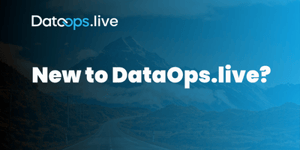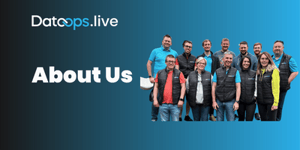So you’ve decided that DataOps.live is the right solution for your company—now what? Like most organizations, you’ll need buy-in from your executives to begin implementation. But how do you sell the investment value of a technical product to a business-driven leader?
To begin with, you must identify the problem you are trying to solve, define whose problem it is to solve, and decide how and where to best spend your budget.
Who's the Boss?
One of the most important aspects of selling to a business leader is to put the problem you are trying to solve for, as well as the solution, into a language they understand. If you start too soon on a technically heavy pitch, you’ll likely lose the attention of your intended audience rather quickly. Instead, you must identify the ideal business outcomes that their particular role finds most valuable to the company.
Keep in mind—DataOps is not a solution in search of a problem. As Snowflake Non-executive Advisor Kent Graziano puts it, “If you’re trying to sell DataOps to a boss that doesn’t see there is a problem—you’re barking up the wrong tree.” A key identifier in knowing that your organization is ready to begin implementing the #TrueDataOps philosophy comes at a stage of maturity where you’re able to recognize the problem in your current process, but don’t yet know the solution.
New to Snowflake
If your stakeholders have recently made the decision to adopt Snowflake, DataOps will only reinforce and accelerate the goals they were hoping to achieve with that investment. Think of DataOps as the framework to operationalize Snowflake faster—it will dramatically increase your organization’s success in adoption while decreasing your time to value. Customers like OneWeb and Roche have moved from zero to production data workloads or data sharing in 2-4 weeks.
Skiing Without Snow Gear
DataOps.live Vice President of Partner Marketing, Laurent Deheuvels, perhaps explains the DataOps and Snowflake relationship best with this simple analogy—utilizing Snowflake without the DataOps.live platform is like skiing without snow gear.
“Say you’re going to invest in the hobby of skiing this winter—so you start to purchase the equipment you think you’ll need: a pair of old skis, random sized snow boots, etc., and then you decide, ‘well, I already have socks that work well for me when I play tennis, those should also work well enough for skiing. Plus I don’t need to buy gloves, I’m usually okay in the cold.”
Deheuvels continues this thought by justifying the initial money he saved at the beginning of the season by skipping out on purchasing ‘nonessentials,’ versus the ROI he’s anticipating from his investment:
“You won’t be at the skiing resort year-round, only on holidays, so you’ll want to have the best possible time there while spending as much time as possible on the slopes, which is why you need the right equipment. This way, you can tackle more slopes, ski better, and enjoy the full benefits of this beautiful sport even more. If you knew the pain that would come from not having the right skis or snow boots, as well as the additional pain of wearing your tennis socks and no gloves—wouldn’t you have purchased the right equipment for yourself to begin with?”
This same philosophy can be used to interpret your data strategy: the needs you have around data won’t diminish over time—they’ll only become more apparent.
Emphasize the Business Value
At some point, your business leaders should identify that they will have to make an investment in enabling software. By implementing DataOps, your organization will be able to eliminate future technical debt, while also identifying errors before they go into production. Graziano continues this idea, stating that DataOps is “an essential piece in having a well-controlled, well-governed data platform that still allows the team to be agile, onboarded, and getting value from new data more quickly.” Ask your leaders this—do you want your team to spend their time building out scripts and processes, then teaching people how to repeat that, or can we simply buy a tool with this already built in and ramp people on the tool?
Build vs. Buy?
Do we build it or do we buy it? It’s a question that has kept data teams up at night for decades, and a topic DataOps.live has covered at length—but has the question ever really been answered?
In this 2016 interview, DTO Solutions cofounder Damon Edwards shared his interpretation of the classic conundrum, “There is nothing inherently wrong with a "buy" position. However, if it is "vs. build," rather than "AND build," you are going to be in trouble.”
At the end of the day, your business leaders are going to be most receptive to ideas that fall into two categories:
- people-centric optimizations
- money-saving initiatives
‘Simply building’ is not going to be a solution that fits into either of those ideologies—as there really is nothing simple about an entirely manual build. According to Gartner, organizations that take on hand coding see a 200% increase in maintenance costs. Additionally, these organizations expose themselves to three in-house production risks overtime by creating operational, strategic, and economic challenges.
Edwards concludes his answer to the question by stating, “The high-performing companies are the ones that are truly learning companies. They have the collective ability to find and fix what's getting in the way…their core advantage is "being good at getting better." That's the engine. Trying to "fix DevOps problems" without building that engine is just chasing symptoms.”
Overcoming Objections
No Budget
If your stakeholders have come back to you and stated that there is no budget for a DevOps project, it is important to emphasize the problem you first identified that began your research. What are the alternatives if they aren’t allocating a budget to solve this problem? Graziano weighs in, “If you truly have no money, that means we are to assume that your highly paid staff is going to have to manually solve this.” Ask your business leaders this:
- Is this a scalable option?
- What is the cost of a server shut down?
- What is your cost to retain a customer vs. your cost to regain a customer?
Too Expensive
Oftentimes a business leader will ask you to consider a cheaper or even free alternative. Graziano speaks on the idea of how ‘free’ free software really is, “It’s free like you just got a free puppy—to get it in the door it’s free, but you’ll still have expenses for food, water, kennel, veterinary bills, etc.” Ask your business leaders this:
- What is more valuable to you—short term cash in the bank (with a need to spend to maintain your DIY solution anyway) or the productivity of your engineers in meeting stakeholder requirements?
Too Complicated
A likely objection you’ll receive from a business leader is that the technology is too complicated and that there must be a simpler solution. If you hear this objection, ask: Do you think buying an integrated piece of software designed specifically to do these functions on Snowflake is more complicated than building all the various functions by hand with an open source software and cobbling it together?
- If it’s too complicated to do DevOps on your data—what is your alternative?
- If it’s too complicated—which step would you like to eliminate?
If someone asks you in the future, "Why did you not have controls to lifecycle manage your data product code?," will the answer, "Because it was too complicated" suffice?
Conclusion
In conclusion, the three main points of action when trying to sell DataOps to a business-oriented leader are as follows:
- Identify and understand the problem you are trying to solve—share it with your boss in their language
- Define whose problem it actually is and why they should care—(as well as the impact if they don't)
- Qualify where your dollars will be best spent—and quantify the risks and costs it will avoid
Remember, DataOps is not a solution in search of a problem, but a solution that will future-proof your data strategy and allow your teams to stay focused on the areas they excel in.
To learn more about how to position an investment in DataOps.live to your key stakeholders, contact a representative today.





